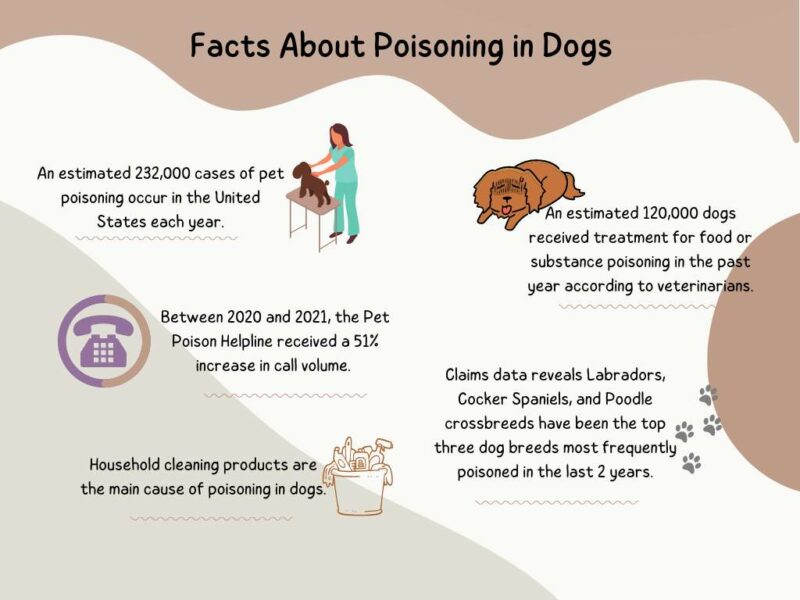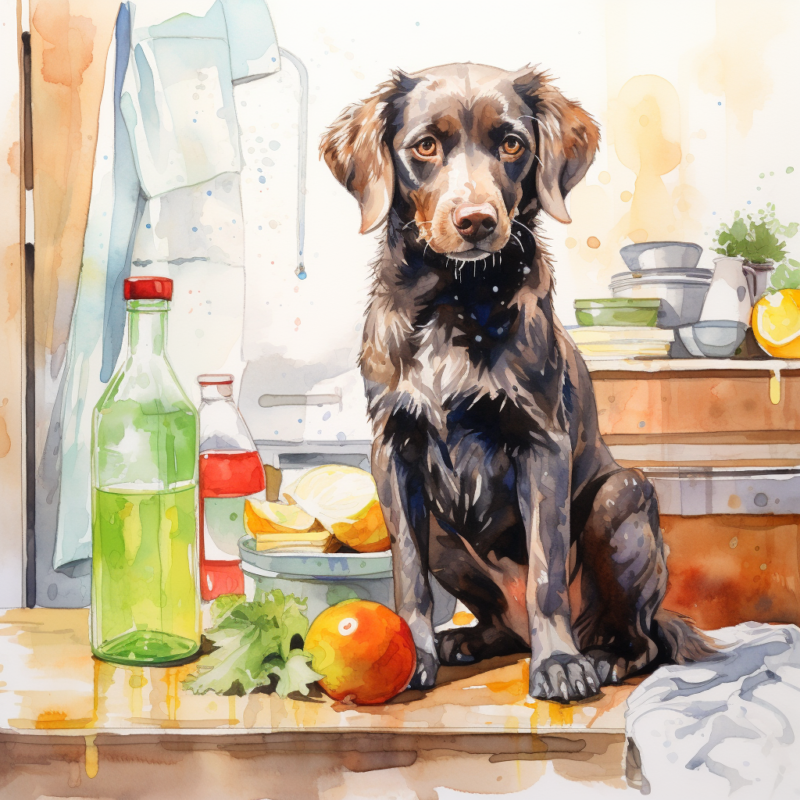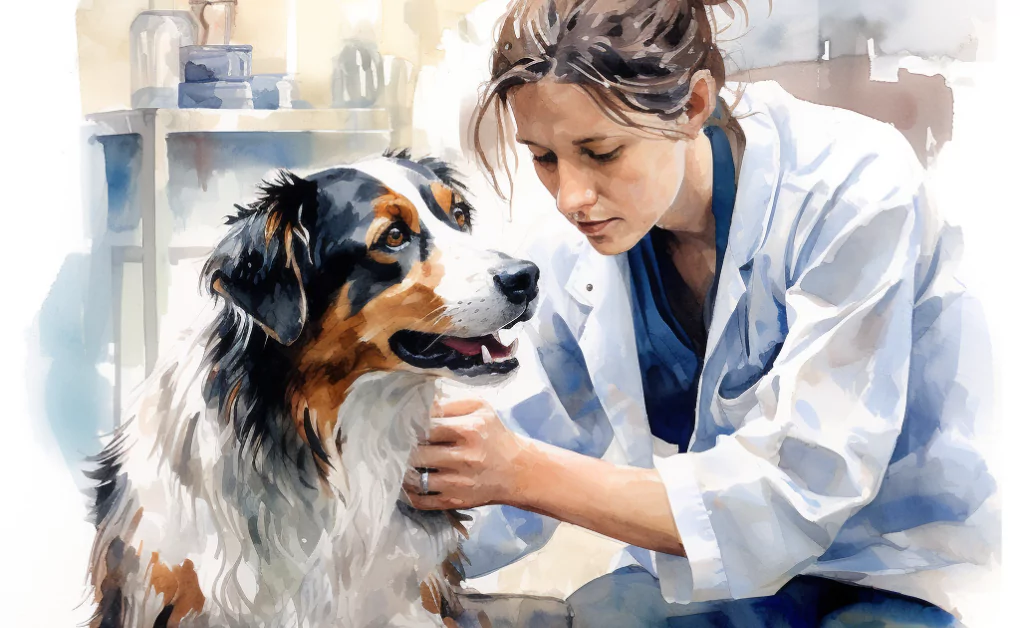What Are Common Dog Poisons?
What is it?
How is it Treated?
Breed Predispositions
There are no specific breeds of dogs that are more predisposed to poisoning. However, puppies, small dogs, and curious dogs may be more susceptible to accidental poisoning due to their exploratory behavior and increased tendency to ingest harmful substances
Introduction
Mia, a loving pet owner, had just come home from a long day at work, eager to spend some quality time with her beloved Labrador Retriever, Daisy. As she entered the living room, she was greeted by a chaotic scene of torn wrappers and scattered food. Her heart dropped when she realized that Daisy had gotten into the pantry and ingested various items, including chocolate, which Mia knew could be toxic to dogs. Frantically searching for her phone, Mia dialed her veterinarian’s emergency number, praying that Daisy would be okay.
Poisoning in dogs encompasses the ingestion, inhalation, or absorption of substances detrimental to their health, which can cause problems. These harmful substances can range from specific chemicals, plants, medications, household products, foods and beverages, and other toxic elements. As per the ASPCA Poison Control, roughly two-thirds of animals who have ingested poison recover within less than an hour. Dogs can inadvertently encounter these poisons through consumption, breathing them in, or skin contact. Once these toxic substances enter the body, they can interrupt normal bodily functions and trigger detrimental effects.
Dog owners must remain vigilant and keep any potentially poisonous substances out of their dogs’ reach. This practice includes securely storing medications, chemicals, cleaning products, and other substances that could be common toxicities and fatal to your dog. Further, being aware of toxic foods, plants, and other substances harmful to dogs can aid in the prevention of accidental poisonings. In cases of pet poisoning or suspicion of exposure to a toxic substance, immediate veterinary attention is necessary to evaluate the situation and administer the appropriate treatment.

Causes of Common Poison in Canines
Poisoning is a common cause of death in dogs. The most common poisons include antifreeze, rat bait, and household cleaners. Poisonous plants are another common source of poisoning. Also, our daily medicine, such as medicine cabinets, can be toxic to our pets.
Poisonous substances for dogs can be categorized into several groups based on their nature and the type of toxicity they pose. These categories include:
Household chemicals
Common household chemicals that are poisonous to dogs:
- Cleaning agents (e.g., bleach, ammonia, disinfectants, drain cleaners)
- Pesticides (e.g., insecticides, rodenticides, garden pesticides)
- Antifreeze (ethylene glycol)
- Detergents
- Fabric softeners
- Toilet bowl cleaners
- All-purpose cleaners
Medications
Certain human medications can be toxic to dogs if ingested. Additionally, some veterinary medications may have adverse effects if not used correctly. According to the American Society for the Prevention of Cruelty to Animals (ASPCA), in 2018 they received 213,773 calls regarding animal ingestion. Of these, almost 20 percent were due to over-the-counter medication, including ibuprofen, Naproxen, cold medicines, and herbal supplements.
Common medications that are poisonous to dogs:
- Human painkillers (e.g., acetaminophen, ibuprofen)
- Antidepressants
- Prescription medications (when not prescribed by a veterinarian)
- Over-the-counter drugs (e.g., cold and flu medications, allergy medications)
Plants
Many common plants and flowers can be toxic to dogs if ingested. Common plants that are poisonous to dogs:
- Lily plants (e.g., Easter lily, tiger lily, daylilies)
- Azaleas and rhododendrons
- Sago’s palm
- Tulip and narcissus bulbs
- Aloe vera (some species)
Foods
Common foods that are poisonous to dogs:
- Chocolate (contains theobromine)
- Grapes and raisins
- Onions and garlic
- Xylitol (found in sugar-free gum, candies, and certain baked goods)
- Avocado (in large amounts)
- Alcohol
- Caffeine (in coffee, tea, energy drinks, etc.)
Outdoor hazards
Common outdoor hazards that are poisonous to dogs:
- Certain plants and mushrooms found outdoors
- Insecticides and herbicides used in gardens and yards
- Toxic substances in bodies of water (e.g., algae blooms, chemicals)
- Snail and slug bait (contains metaldehyde)
- Toxic or spoiled garbage
- Venomous snakes and spiders
Dog owners need to be aware of these categories and take necessary precautions to prevent their dogs from accessing or being exposed to these poisonous substances. If your dog ingests potentially poisonous substances or exhibits poisoning symptoms, contact your veterinarian immediately or seek emergency veterinary care.
Symptoms of Poisoning in Dogs
Symptoms of dog poisoning can diverge based on the poisonous substance or dog poison they’ve ingested. Common indicators of poisoning can include the following:

- Gastrointestinal issues may cause vomiting, diarrhea, drooling, loss of appetite, and abdominal pain may occur.
- Neurological symptoms: Manifestations can range from seizures, tremors, disorientation, stumbling, and weakness to collapse.
- Respiratory problems: Dogs may experience difficulty breathing, coughing, and wheezing.
- Cardiac abnormalities: Irregular heartbeat and coughing, elevated or decreased heart rate.
- Excessive drooling and foaming at the mouth may be evident, and changes in urine color or odor can also occur.
- Presence of Jaundice (yellowing of the skin and eyes).
- The propensity to bleed or bruise easily.
- Pale or bluish gums.
- A state of lethargy, weakness, or a sudden drop in energy levels.
- Increased or decreased body temperature.
These symptoms can shift based on the specific toxin, like xylitol, chocolate, slug pellets, or alcohol, and the amount ingested by dogs. If you think your dog has been exposed to a potentially dangerous item, securing immediate veterinary attention is vital. Contact your veterinarian, an emergency veterinary clinic, or the pet poison helpline for guidance. Certain toxins like chocolate can lead to chocolate poisoning, while xylitol, a sweetener, can lead to severe liver damage or kidney failure. Alcohol poisoning is another risk if dogs ingest alcohol. It is crucial to remember that any substance ingested in excess may cause severe health issues.
Diagnosis of Dog Poisoning
In situations where dog poisoning is suspected, veterinarians utilize various techniques and procedures to identify the same toxic substance and evaluate the extent of the poisoning. Here are some commonly used diagnostic measures:
- Physical check-up: During this initial stage, the vet performs a detailed examination of the dog, searching for any visible signs of poisoning. They assess the dog’s vital signs, screen for anomalies, and look for visible changes such as discoloration, burns, or wounds.
- Collection of historical information and observation: Vets extract necessary information from the dog’s owner about potential exposure to hazardous items or toxic substances. This can include queries about recent ingestion or exposure to specific chemicals, plants, or environmental hazards. Observing changes in the dog’s behavior and symptoms can also play a vital role in the diagnosis.
- Laboratory assessments: The vet may conduct a series of lab tests to confirm the presence of certain toxins or evaluate the functioning of the dog’s organs. These tests can include blood tests to inspect changes in the dog’s red blood cells, urine analysis, fecal examination, or specific toxin screenings. These evaluations are crucial in identifying the type of poisoning and establishing the extent of organ damage, including the potential to cause acute kidney failure in dogs.
- Imaging studies: In certain circumstances, vets may use imaging techniques such as X-rays or ultrasounds to assess internal organ damage or detect foreign bodies that might be contributing to the poisoning.
- Toxicology consultation: In more complex cases or when the specific toxin is still unknown, vets may seek the input of a specialist to help in the diagnosis and treatment plan.
It’s vital to remember that rapid and precise diagnosis is critically important in cases of poisoning. If you suspect your pet has encountered a poisonous substance, you must contact your veterinarian immediately for guidance and follow their advice diligently. This will help keep your pet safe and ensure the most positive outcome, even in scenarios where symptoms may develop several days after consumption of a toxic substance. Remember, even substances found in various products, such as flea and tick products, can cause harm if improperly used.
Treatment for Common Poison in Dogs
The approach to treating poison in dogs hinges on the particular toxin consumed and the seriousness of the poisoning. Consequently, seeking immediate veterinary care in cases of suspected poisoning is crucial. Here are some frequently used treatment methodologies by veterinarians:
Decontamination
The initial move in treating poisoning is to halt further toxin absorption. This might involve triggering vomiting, delivering activated charcoal to bind the toxin within the gastrointestinal tract, or conducting a gastric lavage (stomach pumping) in extremely difficult cases.
Supportive Care
Often, dogs impacted by poisoning necessitate supportive care to stabilize their condition. This could involve intravenous fluids to sustain hydration and expel toxins, medications to manage symptoms like seizures or pain, and steps to uphold organ function.
Specific Antidotes
For certain toxins, such as prescription medications or theobromine in chocolate, specific antidotes are available to neutralize their effects. For example, antivenom is used for snake bites.
Monitoring and Observation
Dogs receiving treatment for poisoning necessitate close monitoring to evaluate their response to treatment and identify any complications or worsening of symptoms. Hence, vital signs, organ function, and other parameters will be routinely assessed.
Symptomatic Treatment
Veterinarians might administer supportive treatments to alleviate specific symptoms linked to the poisoning. This could encompass medications to control vomiting, diarrhea, or allergic reactions.
Hospitalization
Based on the gravity of the poisoning, dogs may need to be hospitalized for intensive care and observation. This permits continuous administration of treatments and meticulous observation of their condition.
It’s of utmost importance to remember that a veterinarian should always provide treatment for poisoning. Employing home remedies or delaying veterinary care can exacerbate the condition and precipitate serious complications. If you suspect your pet has been poisoned, even if just a small amount of a toxin like vitamin D has been ingested, don’t attempt to give your pet any treatment yourself. Instead, contact your veterinarian promptly or seek emergency veterinary care for swift and appropriate treatment. Signs of poisoning may develop within an hour, so time is of the essence.
How to Prevent Your Dog From Getting Poisoned?

Taking preventive measures to avoid common poisoning incidents in dogs requires active steps to shield your pet from potential risks. Here are a few guidelines to assist in minimizing the chances of unintentional poisoning:
- Secure storage of dangerous substances: All medications, household cleaning agents, pesticides, and other substances toxic to pets should be stored in shut cabinets or locked containers, unreachable by your dog. Ensuring all containers are properly sealed is crucial to prevent spills and leaks.
- Plant awareness: Some plants, like lilies, azaleas, and sago palms, can be toxic if eaten by your dog. Investigate which plants are harmful to dogs and either refrain from planting them in your garden or guarantee they are inaccessible to your pet.
- Proper trash disposal: Dogs may suffer from poisoning due to their attraction to the scent of discarded food and other waste. Ensure your trash bins have secure lids and are inaccessible to your dog. Dispose of hazardous waste, like batteries and medications, safely and responsibly.
- Supervision of your dog: Closely monitor your dog, particularly in unfamiliar outdoor settings. Ensure your pet doesn’t eat anything off the ground or chew on potentially harmful objects they could accidentally ingest.
- Utilize pet-safe products: Opt for pet-safe alternatives for cleaning agents, insecticides, and rodenticides. Always read and follow the guidelines on product labels, and securely store them when not in use.
- Education: Ensure you know about the potential dangers of common household items and substances to your dog, and educate your family. Teach children about the importance of keeping medications, chemicals, and other hazards out of the reach of pets.
- Medication caution: Never administer human medications to your dog unless a veterinarian instructs. Keep all medications secure and double-check the label before giving any to your dog to avoid accidental poisoning.
- Food and treat monitoring: Be aware of foods toxic to dogs, such as chocolate, grapes, raisins, onions, and garlic, including the sweetener found in various human food that is harmful when ingested by dogs. Store these items out of your dog’s reach and refrain from using them as treats.
Signs of poisoning may develop within a few hours, so swift action is crucial. Adhering to these guidelines can help keep your dog safe from accidental poisoning.
Frequently Asked Questions
Disclaimer: The information provided on this veterinary website is intended for general educational purposes only and should not be considered as a substitute for professional veterinary advice, diagnosis, or treatment. Always consult a licensed veterinarian for any concerns or questions regarding the health and well-being of your pet. This website does not claim to cover every possible situation or provide exhaustive knowledge on the subjects presented. The owners and contributors of this website are not responsible for any harm or loss that may result from the use or misuse of the information provided herein.







